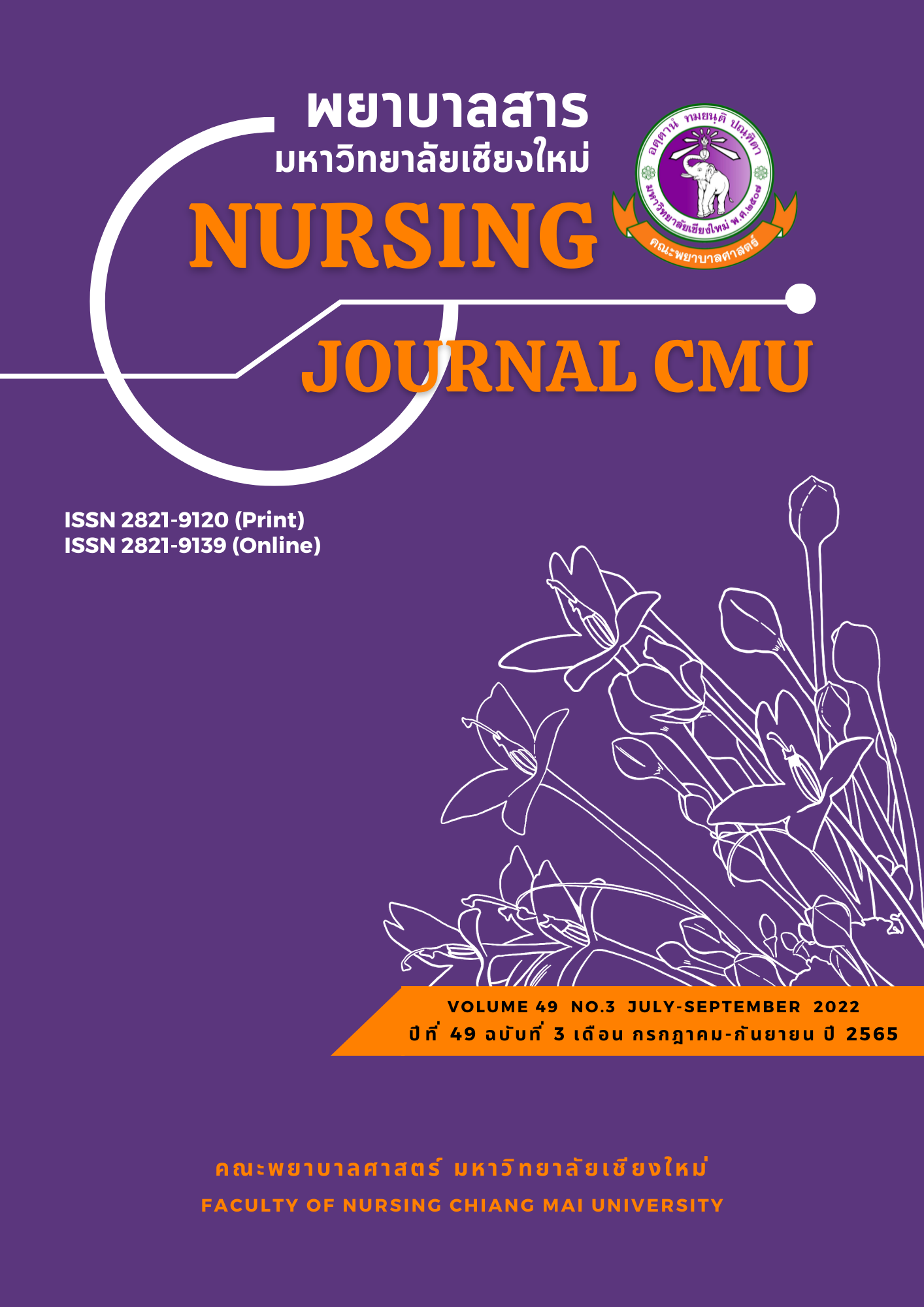Health Literacy and Self-Management Among Elderly Ischemic Stroke Survivors
Keywords:
Self-Management, Health literacy, Elderly ischemic stroke survivorsAbstract
Elderly ischemic stroke survivors with good self-management can reduce disability and complications, and prevent recurrent stroke. This correlational descriptive research investigated health literacy, self-management, and the correlation between health literacy and self-management in elderly ischemic stroke survivors. The participants were 88 older persons, diagnosed with ischemic stroke for 6 months or longer, who received treatment at a sub-district Health Promoting Hospital. Research instruments for data collection included the Personal and Illness Information Questionnaire, the Health Literacy for Elderly Ischemic Stroke Survivors Questionnaire, and the Self-Management for Elderly Ischemic Stroke Survivors Questionnaire. Data were analyzed using descriptive statistics and Pearson’s product-moment correlation.
The results showed that health literacy among elderly ischemic stroke survivors was moderate ( = 39.56, S.D. = 7.89). Self-management among elderly ischemic stroke survivors was high ( = 93.60, S.D. = 9.81). Health literacy was positively and statistically correlated with self-management at a moderate level (r = .386, p = .001).
The results of this study provide basic information for health professionals to support self-management through promoting health literacy among elderly ischemic stroke survivors for enhancing health literacy.
References
Ahn, D.-H., Lee, Y.-J., Jeong, J.-H., Kim, Y.-R., & Park, J.-B. (2015). The effect of post-stroke depression rehabilitation outcome and the impact of caregiver type as a factor of post-stroke depression. Annals of Rehabilitation of Medicine, 39, 74-80.
American Stroke Association. (2019). A guide for patients and caregivers: Life after stroke our path forward. Retrieved from https://www.stroke.org/-/media/Stroke-Files/life-after-stroke/Life-After-Stroke-Guide_7819.pdf
American Stroke Association. (2021). Life after stroke. Retrieved from https://www.stroke.org/ en/professionals/stroke-survivor-2-survivor
Burns, N., & Grove, S. K. (2009). The practice of nursing research: Appraisal, synthesis, and generation of evidence (6th ed.). Philadelphia: Elsevier Saunders.
Chen, Y. C., Chang, L. C., Liu, C. Y., Ho, Y. F., Weng, S. C., & Tsai, T. I. (2018). The roles of social support and health literacy in self-management among patients with chronic kidney disease. Journal of Nursing Scholarship, 50(3), 265-275. doi:10.1111/jnu.12377
Cohen, J. (1988). Statistical power analysis for the behavioral sciences (2nd ed.). Hillside, NJ: Lawrence Erlbaum Associates.
Daemayu, A., Panuthai, S., & Juntasopeepun, P. (2020). Correlation between health literacy and self-management amongst older Thai Muslims with hypertension. Journal of Thailand Nursing, 35(3), 87-107. (in Thai)
Department of Medicine, Ministry of Public Health. (2014). Guide to screening/evaluation of the elderly. Nonthaburi: The Veterans Organization's Welfare Press Office. (in Thai)
Department of Medical Services, Ministry of Public Health. (2015). Handbook practice guidelines for stroke patients’ caregiver. Chonburi: Somdej Phra Sangharaj Nganasamvara Geriatric Hospital. (in Thai)
Drost, E. A. (2011). Validity and reliability in social science research. International Perspectives on Higher Education Research, 38(1), 105-124.
Geboers, B., Winter, A. F., Spoorenberg, S. L., Wynia, K., & Reijneveld, S. A. (2016). The association between health literacy and self-management abilities in adults aged 75 and older, and its moderators. Quality of Life Research, 25(11), 2869-2877.
Guan, F. G., Wang, M., & Lian, X. Q. (2018). The status quo and influence of self-management behaviors in convalescent stroke patients. Frontiers of Nursing, 5(2), 119-125. doi:10.2478/fon-2018-0016
Heijmans, M., Waverijn, G., Rademakers, J., van der Vaart, R., & Rijken, M. (2015). Functional, communicative and critical health literacy of chronic disease patients and their importance for self-management. Patient Education and Counseling, 98(1), 41-48.
Intarasombat, P. (1996), Health assessment in the elderly. Ramathibodi Nursing Journal, 2(3), 44-56. (in Thai)
Khumsa-ard, S., Thiangtham, W., & Suwan-ampai, P. (2017), Behavior factors related to recurrent stroke. Journal of Public Health Nursing, 31(Special Edition), 13-26. (in Thai)
Lo, S. H. S., Chang, A. M., & Chau, P. C. (2016). Study protocol: A randomised controlled trial of a nurse-led community-based self-management programme for improving recovery among community-residing stroke survivors. BMC Health Services Research, 16, 387. doi:10.1186/s12913-016-1642-9
Lorig, K. R., & Holman, H. R. (2003). Self-management education: History, definition, outcome, and mechanisms. The Society of Behavioral Medicine, 26(1), 1-7.
Noppakraw, J., Chintanawat, R., & Khampolsiri, T. (2020), Health literacy and self-management in older persons with type 2 diabetes mellitus. Nursing Journal,47(2), 251-261. (in Thai)
Nutbeam, D. (2000). Health literacy as a public health goal: A challenge for contemporary health education and communication strategies into the 21st century. Health Promotion International, 15(3), 259-267.
Pfeiffer, E. (1975). A short portable mental status questionnaire for the assessment of organic brain deficit in elderly patients. Journal of the American Geriatrics Society, 23(10), 433-441.
Polit, D. F., & Beck, C. T. (2004). Nursing research: Principles and methods. Philadelphia: Lippincott Williams & Wilkins.
Ren, X-R., Wei, Y. Y., Su, X-N., Hua, Y., Shao, P., Xiao, T., … Guo, H-X. (2020). Correlation between self-perceived burden and self-management behavior in elderly stroke survivors: A longitudinal observational study. Medicine (Baltimore), 99(44). doi: 10.1097/MD.0000000000022862
Research Office for the Development of Thai Health Security. (2014). The complete report, a study of differences between stroke services health benefits and outcomes: A quantitative study. Bangkok: Ministry of Public Health. (in Thai)
Stroke Association. (2012). Emotional changes after stroke. Retrieved from https://www.stroke.org.uk/sites/default/files/Emotional%20changes%20after%20stroke.pdf
Stroke Association. (2021). Living with stroke. Retrieved from https://www.stroke.org.uk/effects-of-stroke
Suangpho, P., Srisaenpang, P., & Saengsuwan, J. (2014), Self-care behaviors of older persons with recurrent stroke. North-Eastern Thai Journal of Neuroscience, 8(4), 9-25. (in Thai)
Thai Stroke Society. (2018). How to take care of patient with stroke? Journal of Thai Stroke Society, 17(2), 25-40.
World Stroke Organization. (2018). World stroke organization annual report 2018. Retrieved from https://www.world-stroke.org
Yadav, U. N., Lloyd, J., Hosseinzadeh, H., Baral, K. P., Bhatta, N., & Harris, M. F. (2020). Self-management practice, associated factors and its relationship with health literacy and patient activation among multi-morbid COPD patients from rural Nepal. BMC Public Health, 20, 1-7. doi:10.1186/s12889-020-8404-7
Zhao, C., Zhao, M., & Li, C. (2020). The health literacy status and influencing factors of the high-risk stroke population in Jilin Province. Journal of Public Health, 30, 855-860.
Downloads
Published
How to Cite
Issue
Section
License
Copyright (c) 2022 Nursing Journal

This work is licensed under a Creative Commons Attribution-NonCommercial-NoDerivatives 4.0 International License.
บทความที่ได้รับการตีพิมพ์เป็นลิขสิทธิ์ของวารสารพยาบาลสาร
ข้อความที่ปรากฏในบทความแต่ละเรื่องในวารสารวิชาการเล่มนี้เป็นความคิดเห็นส่วนตัวของผู้เขียนแต่ละท่านไม่เกี่ยวข้องกับมหาวิทยาลัยเชียงใหม่ และคณาจารย์ท่านอื่นๆในมหาวิทยาลัยฯ แต่อย่างใด ความรับผิดชอบองค์ประกอบทั้งหมดของบทความแต่ละเรื่องเป็นของผู้เขียนแต่ละท่าน หากมีความผิดพลาดใด ๆ ผู้เขียนแต่ละท่านจะรับผิดชอบบทความของตนเองแต่ผู้เดียว






